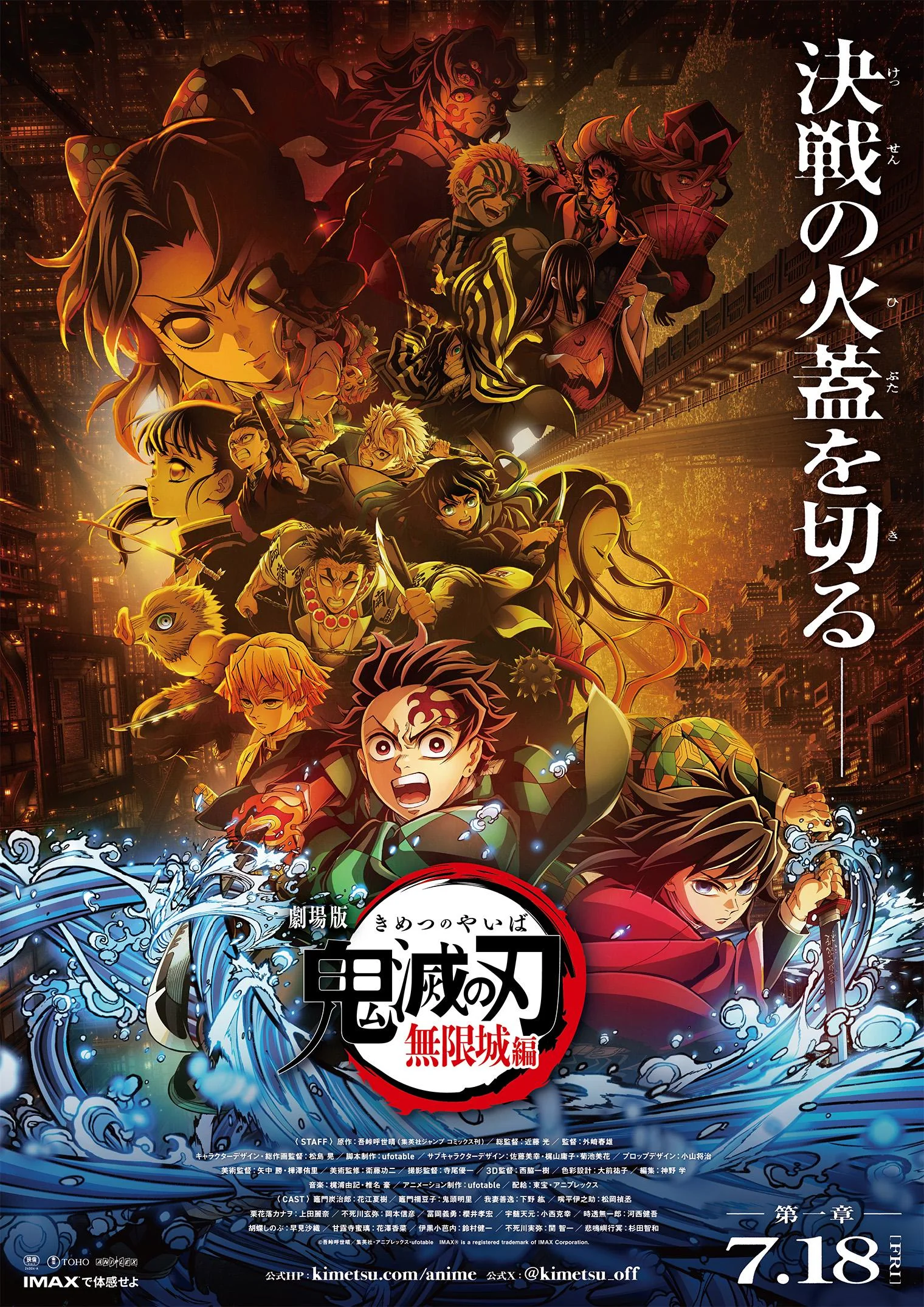
Demon Slayer: Kimetsu no Yaiba Infinity Castle – Chapter 1: The Return of Akaza has taken the anime world by storm since its debut in Japan on July 18, 2025. In just a few days, the film has crushed multiple box office records, including surpassing the three-day opening record previously held by Demon Slayer: Mugen Train—a monumental feat considering Mugen Train was already the highest-grossing anime film in history.

This latest installment adapts the highly anticipated Infinity Castle arc from Koyoharu Gotouge’s original manga, which is widely regarded as one of the most intense and emotionally charged segments of the series. The arc features the climactic battle between the Demon Slayer Corps and the Twelve Kizuki, pushing the animation studio Ufotable’s signature blend of breathtaking visuals and fluid fight choreography to new heights.
Industry experts are calling Infinity Castle the biggest anime release of 2025, praising its seamless storytelling, character development, and the innovative use of IMAX technology, which enhances the immersive experience for audiences. The newly released IMAX poster underscores the film’s premium presentation and ongoing promotional momentum.
Beyond box office success, the film is expected to be a strong contender in upcoming anime and film awards, potentially solidifying Demon Slayer’s legacy as a cultural phenomenon that transcends the anime niche to impact global pop culture.
For international fans eager to watch Infinity Castle, the film is slated for streaming release between October and December 2025 or early 2026. This window aligns with the growing trend of anime films receiving worldwide digital distribution shortly after their theatrical runs, reflecting the franchise’s expanding global reach.
The Demon Slayer franchise itself has revolutionized the anime industry, credited with revitalizing interest in traditional animation techniques while embracing cutting-edge digital effects. Its success has paved the way for other anime properties to achieve mainstream recognition and commercial viability outside Japan.
In summary, Demon Slayer: Infinity Castle is not just another anime movie; it is a landmark event that continues to push boundaries in storytelling, animation quality, and global fandom engagement. Whether you are a longtime fan or new to the series, this film promises an unforgettable cinematic experience that cements Demon Slayer’s place in anime history.
Tenjutsu
Tenjutsu brings a fresh take on the action roguelike genre. This 2D game puts players in the role of a renegade yakuza fighting against four crime syndicates in Secret Garden City. Tenjutsu combines fast-paced martial arts combat with city-rebuilding elements, offering multiple endings based on player choices.
Players use a mix of hand-to-hand combat and weapons to defeat enemies and progress through the game. The fluid combat system allows for unlocking new moves and abilities as players advance. Tenjutsu’s pixel art style adds visual appeal to the action-packed gameplay.
Developed by Sébastien Benard, co-creator of Dead Cells, Tenjutsu promises a challenging and rewarding experience. The game’s roguelike elements ensure each playthrough is unique, with players adapting their strategies to overcome various obstacles and enemies.
Key Takeaways
- Tenjutsu is a 2D action roguelike featuring a renegade yakuza protagonist
- The game combines martial arts combat with city-rebuilding mechanics
- Tenjutsu offers multiple endings and replayability through its roguelike structure
Origins and Development of Tenjutsu
Tenjutsu emerged as a combat system blending martial arts mastery with weapon expertise. Its evolution spans centuries, adapting to modern contexts while preserving core principles.
Historical Evolution
Tenjutsu traces its roots to ancient Japanese combat techniques. Samurai warriors developed these methods for close-quarters fighting. The system focused on efficient movements and precise strikes.
Early tenjutsu practitioners used swords, spears, and hand-to-hand combat. They trained rigorously to perfect their skills. Over time, tenjutsu incorporated elements from other martial arts.
During the Edo period, tenjutsu schools formalized their teachings. Masters passed down secret techniques to chosen disciples. This helped preserve the art’s authenticity.
Modern Adaptations
In recent years, tenjutsu has evolved to meet contemporary needs. Law enforcement and military units have adopted modified versions. These adaptations focus on practical self-defense in urban settings.
Modern tenjutsu training includes a wider range of weapons. Practitioners learn to use everyday objects for protection. Some schools integrate firearms training into their curricula.
Video games like “Tenjutsu” by Deepnight Games showcase the art’s appeal. These digital adaptations introduce tenjutsu to a global audience. They highlight the system’s fluid movements and strategic depth.
Competitive tenjutsu tournaments now take place worldwide. These events showcase practitioners’ skills and promote cultural exchange. Many participants blend traditional techniques with personal innovations.
Tenjutsu in Gaming
Tenjutsu brings a fresh take on roguelike mechanics and fluid combat to the gaming world. This innovative title blends fast-paced action with strategic elements, offering players a unique and challenging experience.
Gameplay Mechanics
Tenjutsu incorporates roguelike elements into its core gameplay. Players navigate through procedurally generated levels, facing different enemies and challenges each run. The game features permadeath, adding tension and high stakes to every encounter.
Weapon variety plays a key role. Players can wield different arms, each with unique movesets and strengths. This diversity encourages experimentation and adaptation to various combat situations.
Progression systems allow characters to grow stronger over time. Players unlock new abilities, upgrade existing skills, and discover powerful items to aid their journey through Secret Garden City.
Fluid Combat Systems in Games
Tenjutsu’s combat system emphasizes fluidity and player skill. Attacks chain together seamlessly, allowing for complex combos and stylish maneuvers. The game rewards precise timing and positioning, creating a satisfying skill curve for players to master.
Defensive options like dodges and parries add depth to engagements. These techniques require split-second decisions, keeping players on their toes during intense fights.
Environmental interactions enhance combat possibilities. Players can use level elements to gain advantages, such as knocking enemies into hazards or using objects as improvised weapons.
Prominent Tenjutsu-Inspired Games
Dead Cells stands out as a major influence on Tenjutsu. Both games share a focus on fast, skill-based combat and roguelike progression. Dead Cells’ success paved the way for Tenjutsu’s blend of martial arts and procedural generation.
Devolver Digital, known for publishing unique and innovative titles, brings Tenjutsu to market. Their involvement signals confidence in the game’s potential to stand out in the crowded action game landscape.
Other titles like Hades and Enter the Gungeon share DNA with Tenjutsu. These games combine tight combat, roguelike elements, and compelling narratives to create engaging experiences that keep players coming back for more.
Tenjutsu and Player Experience
Tenjutsu offers players a rich combat roguelike experience with deep customization options and challenging progression. The game rewards tactical precision and mastery of diverse weapons and techniques.
Customization and Upgrades
Tenjutsu provides a wide array of customization options for players. The game features numerous weapons, each with unique gameplay mechanics. Players can unlock special skills and techniques as they progress, adding depth to their combat repertoire.
The upgrade system allows for character growth and playstyle refinement. Players can enhance their abilities, unlock new moves, and improve weapon proficiency. This system encourages experimentation with different builds and strategies.
Weapon variety is a key element of Tenjutsu’s customization. Players can choose from:
- Melee weapons (swords, batons, fists)
- Ranged weapons (guns, thrown weapons)
- Exotic weapons (unique to the game world)
Challenge and Progression
Tenjutsu incorporates roguelike elements to create a challenging and dynamic experience. The game features permadeath, raising the stakes for each run. Randomly generated elements keep playthroughs fresh and unpredictable.
Players face increasingly difficult enemies as they progress. The game employs a system where foes become tougher the longer a run lasts. This mechanic encourages efficient play and strategic decision-making.
Tenjutsu’s progression system allows players to tackle the four crime syndicates in any order. This non-linear approach affects the game’s difficulty curve and narrative flow. Players must weigh the pros and cons of their chosen path:
- Easier syndicates first: Build strength gradually
- Harder syndicates first: High risk, potentially high reward
The game’s combat system rewards skill and tactical thinking. Players must master timing, positioning, and resource management to succeed.
Relevance to Modern Culture
Tenjutsu’s influence extends beyond its historical roots, shaping contemporary media and social structures. Its principles and practices continue to resonate in various aspects of modern life.
Influence on Popular Media
Tenjutsu has found its way into movies, TV shows, and video games. Films like “The Last Samurai” and “47 Ronin” showcase traditional sword techniques, captivating audiences worldwide. Video game franchises such as “Sekiro: Shadows Die Twice” and “Ghost of Tsushima” incorporate Tenjutsu-inspired combat mechanics, allowing players to experience the art firsthand.
Anime and manga series often feature characters skilled in Tenjutsu. “Rurouni Kenshin” and “Demon Slayer” depict protagonists using sword techniques rooted in this ancient practice. These portrayals spark interest in traditional martial arts among younger generations.
Tenjutsu in Community and Social Structures
Modern dojos and martial arts schools teach Tenjutsu techniques, preserving the art for future generations. These establishments serve as community hubs, fostering discipline, respect, and physical fitness. Students learn not only combat skills but also important life lessons and cultural values.
Tenjutsu principles find application in team-building exercises and leadership training. Companies and organizations use sword-based activities to promote focus, coordination, and strategic thinking among employees. This adaptation of traditional practices to modern contexts highlights Tenjutsu’s enduring relevance.
Local festivals and cultural events often feature Tenjutsu demonstrations, connecting communities to their heritage. These displays attract tourists and boost local economies, supporting shops and restaurants in the area.
Frequently Asked Questions
Tenjutsu, a gritty combat roguelike, has generated interest among gamers. Players have questions about its release, platforms, and gameplay features.
What is the official release date for Tenjutsu?
Tenjutsu’s official release date is June 8, 2024. This information comes from IGN’s news coverage of the game.
Is Tenjutsu available on mobile platforms?
Tenjutsu is not currently available on mobile platforms. The game’s primary focus appears to be on console and PC releases.
On which consoles can Tenjutsu be played?
Specific console information for Tenjutsu is limited. The game is likely to be available on major gaming platforms, but official announcements are pending.
What does the term ‘Tenjutsu’ signify in the context of the game?
The term ‘Tenjutsu’ in the game’s context is not explicitly defined in the available information. It may relate to the martial arts and combat focus of the gameplay.
Has Tenjutsu been adapted into an anime series?
There is no information suggesting that Tenjutsu has been adapted into an anime series. The game appears to be a standalone video game project.
Can you use the Tenjutsu game protagonist in cross-platform play?
Cross-platform play for Tenjutsu is not mentioned in the available information. The game’s multiplayer features, if any, have not been detailed in the provided sources.






